Unit 2 I’ll help to clean up the city parks学案7课时(无答案)
文档属性
| 名称 | Unit 2 I’ll help to clean up the city parks学案7课时(无答案) |
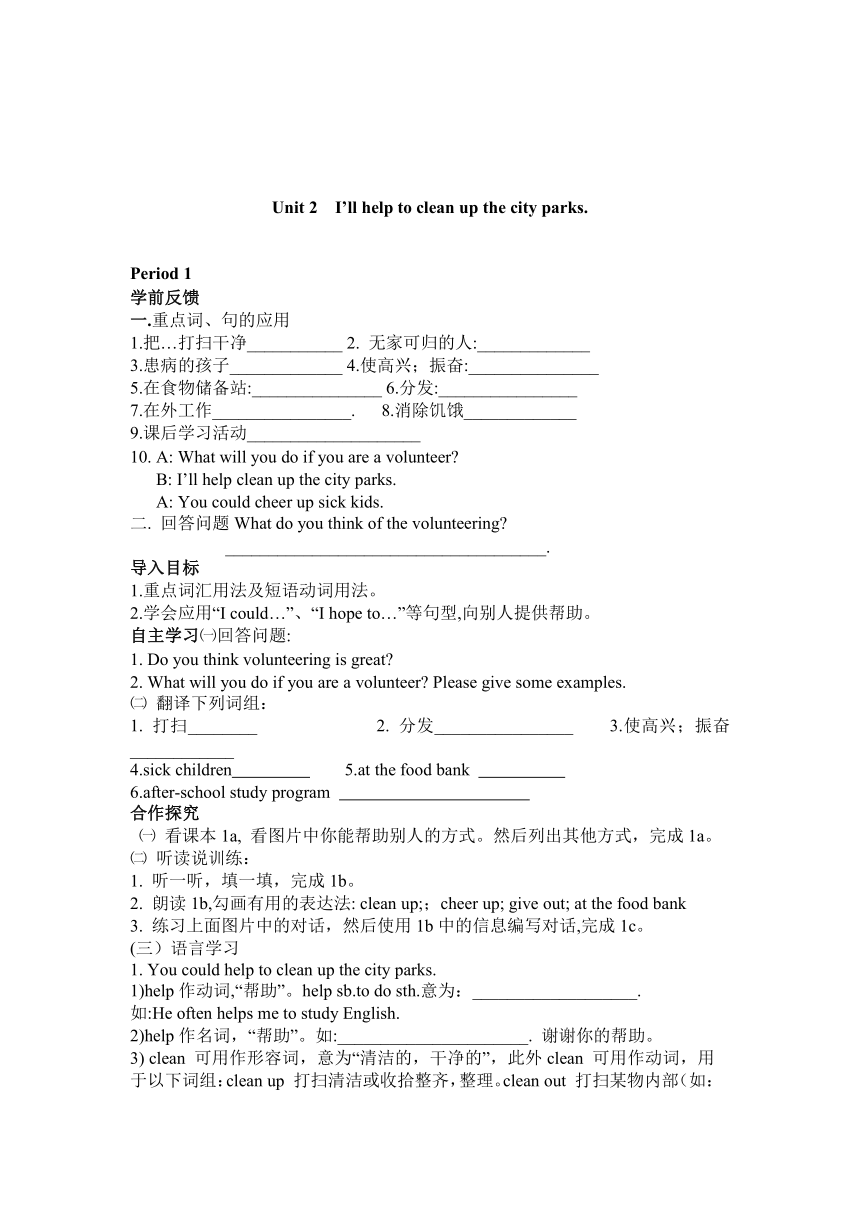
|
|
| 格式 | zip | ||
| 文件大小 | 24.6KB | ||
| 资源类型 | 教案 | ||
| 版本资源 | 人教新目标(Go for it)版 | ||
| 科目 | 英语 | ||
| 更新时间 | 2019-02-23 00:00:00 | ||
图片预览

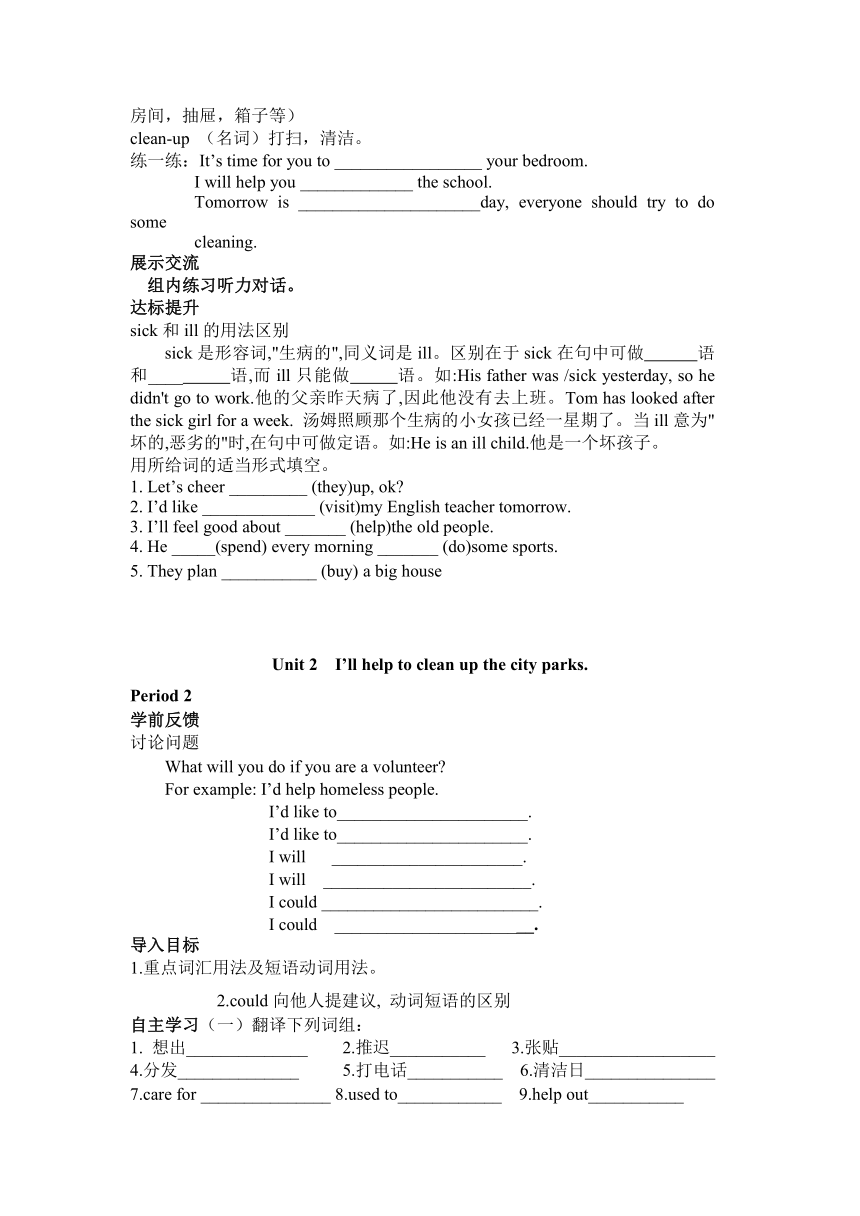
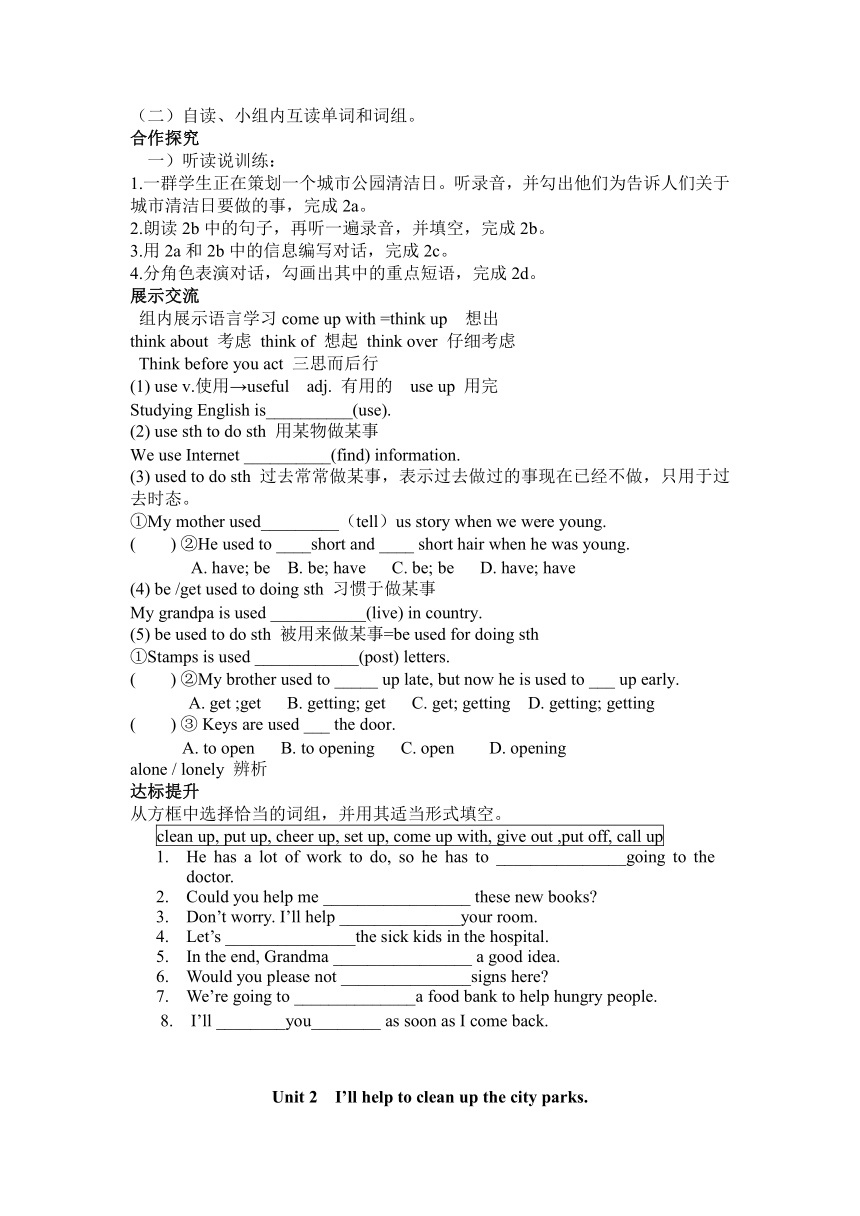
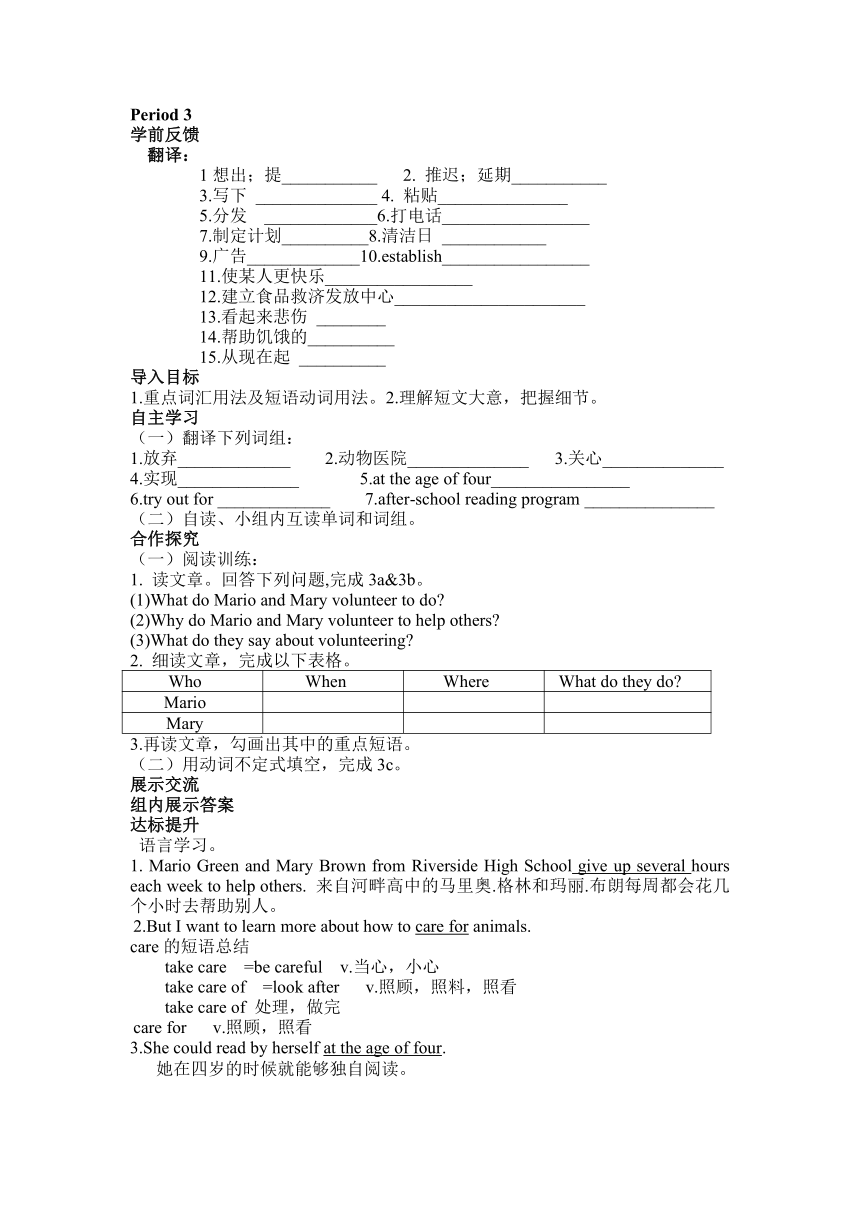
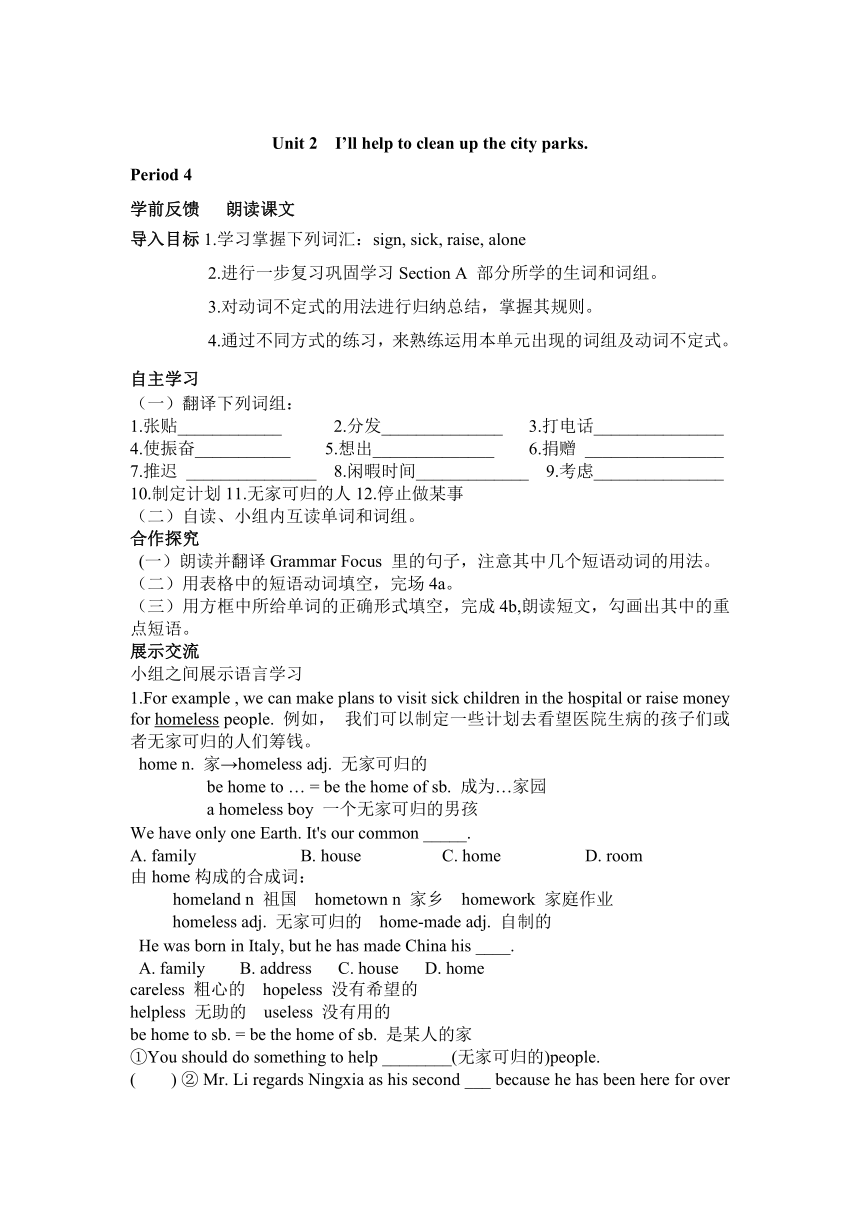
文档简介
Unit 2 I’ll help to clean up the city parks.
Period 1
学前反馈
一.重点词、句的应用
1.把…打扫干净___________ 2. 无家可归的人:_____________
3.患病的孩子_____________ 4.使高兴;振奋:_______________
5.在食物储备站:_______________ 6.分发:________________
7.在外工作________________. 8.消除饥饿_____________
9.课后学习活动____________________
10. A: What will you do if you are a volunteer?
B: I’ll help clean up the city parks.
A: You could cheer up sick kids.
二. 回答问题What do you think of the volunteering?
_____________________________________.
导入目标
1.重点词汇用法及短语动词用法。
2.学会应用“I could…”、“I hope to…”等句型,向别人提供帮助。
自主学习㈠回答问题:
1. Do you think volunteering is great?
2. What will you do if you are a volunteer? Please give some examples.
㈡ 翻译下列词组:
1. 打扫________ 2. 分发________________ 3.使高兴;振奋____________
4.sick children 5.at the food bank
6.after-school study program
合作探究
㈠ 看课本1a, 看图片中你能帮助别人的方式。然后列出其他方式,完成1a。
㈡ 听读说训练:
1. 听一听,填一填,完成1b。
2. 朗读1b,勾画有用的表达法: clean up;;cheer up; give out; at the food bank
3. 练习上面图片中的对话,然后使用1b中的信息编写对话,完成1c。
(三)语言学习
1. You could help to clean up the city parks.
1)help作动词,“帮助”。help sb.to do sth.意为:___________________.
如:He often helps me to study English.
2)help作名词,“帮助”。如:______________________. 谢谢你的帮助。
3) clean 可用作形容词,意为“清洁的,干净的”,此外clean 可用作动词,用于以下词组:clean up 打扫清洁或收拾整齐,整理。clean out 打扫某物内部(如:房间,抽屉,箱子等)
clean-up (名词)打扫,清洁。
练一练:It’s time for you to _________________ your bedroom.
I will help you _____________ the school.
Tomorrow is _____________________day, everyone should try to do some
cleaning.
展示交流
组内练习听力对话。
达标提升
sick和ill的用法区别
sick是形容词,"生病的",同义词是ill。区别在于sick在句中可做 语和____ 语,而ill只能做 语。如:His father was /sick yesterday, so he didn't go to work.他的父亲昨天病了,因此他没有去上班。Tom has looked after the sick girl for a week. 汤姆照顾那个生病的小女孩已经一星期了。当ill意为"坏的,恶劣的"时,在句中可做定语。如:He is an ill child.他是一个坏孩子。
用所给词的适当形式填空。
1. Let’s cheer _________ (they)up, ok?
2. I’d like _____________ (visit)my English teacher tomorrow.
3. I’ll feel good about _______ (help)the old people.
4. He _____(spend) every morning _______ (do)some sports.
5. They plan ___________ (buy) a big house
Unit 2 I’ll help to clean up the city parks.
Period 2
学前反馈
讨论问题
What will you do if you are a volunteer?
For example: I’d help homeless people.
I’d like to______________________.
I’d like to______________________.
I will ______________________.
I will ________________________.
I could _________________________.
I could _______________________.
导入目标
1.重点词汇用法及短语动词用法。
2.could向他人提建议, 动词短语的区别
自主学习(一)翻译下列词组:
想出______________ 2.推迟___________ 3.张贴__________________
分发______________ 5.打电话___________ 6.清洁日_______________
7.care for _______________ 8.used to____________ 9.help out___________
(二)自读、小组内互读单词和词组。
合作探究
一)听读说训练:
1.一群学生正在策划一个城市公园清洁日。听录音,并勾出他们为告诉人们关于城市清洁日要做的事,完成2a。
2.朗读2b中的句子,再听一遍录音,并填空,完成2b。
3.用2a和2b中的信息编写对话,完成2c。
4.分角色表演对话,勾画出其中的重点短语,完成2d。
展示交流
组内展示语言学习come up with =think up 想出
think about 考虑 think of 想起 think over 仔细考虑
Think before you act 三思而后行
(1) use v.使用→useful adj. 有用的 use up 用完
Studying English is__________(use).
(2) use sth to do sth 用某物做某事
We use Internet __________(find) information.
(3) used to do sth 过去常常做某事,表示过去做过的事现在已经不做,只用于过去时态。
①My mother used_________(tell)us story when we were young.
( ) ②He used to ____short and ____ short hair when he was young.
A. have; be B. be; have C. be; be D. have; have
(4) be /get used to doing sth 习惯于做某事
My grandpa is used ___________(live) in country.
(5) be used to do sth 被用来做某事=be used for doing sth
①Stamps is used ____________(post) letters.
( ) ②My brother used to _____ up late, but now he is used to ___ up early.
A. get ;get B. getting; get C. get; getting D. getting; getting
( ) ③ Keys are used ___ the door.
A. to open B. to opening C. open D. opening
alone / lonely 辨析
达标提升
从方框中选择恰当的词组,并用其适当形式填空。
clean up, put up, cheer up, set up, come up with, give out ,put off, call up
He has a lot of work to do, so he has to _______________going to the doctor.
Could you help me _________________ these new books?
Don’t worry. I’ll help ______________your room.
Let’s _______________the sick kids in the hospital.
In the end, Grandma ________________ a good idea.
Would you please not _______________signs here?
We’re going to ______________a food bank to help hungry people.
8. I’ll ________you________ as soon as I come back.
Unit 2 I’ll help to clean up the city parks.
Period 3
学前反馈
翻译:
1想出;提___________ 2. 推迟;延期___________
3.写下 ______________ 4. 粘贴_______________
5.分发 _____________6.打电话_________________
7.制定计划__________8.清洁日 ____________
9.广告_____________10.establish_________________
11.使某人更快乐_________________
12.建立食品救济发放中心______________________
13.看起来悲伤 ________
14.帮助饥饿的__________
15.从现在起 __________
导入目标
1.重点词汇用法及短语动词用法。2.理解短文大意,把握细节。
自主学习
(一)翻译下列词组:
1.放弃_____________ 2.动物医院______________ 3.关心______________
4.实现______________ 5.at the age of four________________
6.try out for _____________ 7.after-school reading program _______________
(二)自读、小组内互读单词和词组。
合作探究
(一)阅读训练:
1. 读文章。回答下列问题,完成3a&3b。
(1)What do Mario and Mary volunteer to do?
(2)Why do Mario and Mary volunteer to help others?
(3)What do they say about volunteering?
2. 细读文章,完成以下表格。
Who
When
Where
What do they do?
Mario
Mary
3.再读文章,勾画出其中的重点短语。
(二)用动词不定式填空,完成3c。
展示交流
组内展示答案
达标提升
语言学习。
1. Mario Green and Mary Brown from Riverside High School give up several hours each week to help others. 来自河畔高中的马里奥.格林和玛丽.布朗每周都会花几个小时去帮助别人。
2.But I want to learn more about how to care for animals.
care的短语总结
take care =be careful v.当心,小心
take care of =look after v.照顾,照料,照看
take care of 处理,做完
care for v.照顾,照看
3.She could read by herself at the age of four.
她在四岁的时候就能够独自阅读。
Unit 2 I’ll help to clean up the city parks.
Period 4
学前反馈 朗读课文
导入目标1.学习掌握下列词汇:sign, sick, raise, alone
2.进行一步复习巩固学习Section A 部分所学的生词和词组。
3.对动词不定式的用法进行归纳总结,掌握其规则。
4.通过不同方式的练习,来熟练运用本单元出现的词组及动词不定式。
自主学习
(一)翻译下列词组:
1.张贴____________ 2.分发______________ 3.打电话_______________
4.使振奋___________ 5.想出______________ 6.捐赠 ________________
7.推迟 _______________ 8.闲暇时间_____________ 9.考虑_______________
10.制定计划11.无家可归的人12.停止做某事
(二)自读、小组内互读单词和词组。
合作探究
(一)朗读并翻译Grammar Focus 里的句子,注意其中几个短语动词的用法。
(二)用表格中的短语动词填空,完场4a。
(三)用方框中所给单词的正确形式填空,完成4b,朗读短文,勾画出其中的重点短语。
展示交流
小组之间展示语言学习
1.For example , we can make plans to visit sick children in the hospital or raise money for homeless people. 例如, 我们可以制定一些计划去看望医院生病的孩子们或者无家可归的人们筹钱。
home n. 家→homeless adj. 无家可归的
be home to … = be the home of sb. 成为…家园
a homeless boy 一个无家可归的男孩
We have only one Earth. It's our common _____.
A. family B. house C. home D. room
由home构成的合成词:
homeland n 祖国 hometown n 家乡 homework 家庭作业
homeless adj. 无家可归的 home-made adj. 自制的
He was born in Italy, but he has made China his ____.
A. family B. address C. house D. home
careless 粗心的 hopeless 没有希望的
helpless 无助的 useless 没有用的
be home to sb. = be the home of sb. 是某人的家
①You should do something to help ________(无家可归的)people.
( ) ② Mr. Li regards Ningxia as his second ___ because he has been here for over twenty years.
A. family B. house C. room D. home
2.Some people even stop doing their jobs for a few months to a year to move to another country, like Africa,and help people there.
有些人甚至会停下自己的工作几个月到一年去其他的国家,像非洲,并且帮助那里的人们。
stop doing
stop doing sth. 停止做某事 Please stop speaking.请停止讲话
(2)stop to do sth. 停下来去做另外一件事 Please stop to talk.请停下来讲话
(3)stop sb. from doing sth. =keep sb from doing sth=prevent sb from doing sth 阻止某人做某事
(4)can’t stop doing sth. 忍不住做……
( )①Seeing their teacher ____ into the classroom, they stopped _____ at once.
A. walk; telling B. entering; to speak
C. enter; to tell D. walking; talking
( )②—Dad, why must I stop computer games?
—For your health, my boy.
A. play B. to play C. to playing D. playing
达标提升
用你自己的想法完成下面的句子,使用动词不定式,完成4c。
Unit 2 I’ll help to clean up the city parks.
Period 5
学前反馈㈠ 看课本1a, 翻译下列词组。
用完____________ 2.长得像___________ 3. 修理;安装_______________
4.捐赠________________ 5. 与......相似__________________
㈡ 试用以上短语来造句。
如: 1 我已用完我的钱了。_____________________.
2她长得像母亲。_____________________.
3他会修理他的自行车。 _____________________.
4 这个富人把他的钱捐给这些贫穷的孩子。_______________________.
5我的书包与你的相似。________________________.
导入目标
【学习目标】1.重点词汇用法及短语动词用法。
2.掌握短语:run out of, take after, fix up, give away的运用及听力技能提高。
自主学习
看课本1a, 把意思相近的句子搭配起来,完成1a。
合作探究
Pair work, 把短语动词与名词相搭配,然后用这些短语造句,完成1b。
讨论并回答问题:
1. What will you do if your bike is broken or old?
2. Can you repair it by yourself? / Do you have your bike repaired?
听一听,填一填,选一选,完成 1c 和 1d.
展示交流
Pair work 根据听力的对话内容,首先理解对话,模仿对话。
表演对话(Act out)叫部分同学演示其对话内容。
用1c和1d.中的信息,分角色表演吉米与记者之间的对话,完成1e。
达标提升
词语释义。
( )1. She doesn’t have any more of it.
A. takes after B. looks out C. runs out of D. gives away
( )2.Have you fixed them up?
A. repair B. repairs C. repairing D. repaired
( )3. They take after me.
A. be similar to B. is similar to C. be similar with D. are similar to
( )4.Could you put up the pictures on the wall?
A. hang B. take C. give D. bring
( )5. Did you think up a good idea?
A. set up B. cheer up C. come up with D. ran out of
( )6.We are no longer students. We should find a job.
A. never B. still C. no…any more D. not…any longer
Unit 2 I’ll help to clean up the city parks.
Period 6
学前反馈
Recite GF.
导入目标
1.通过阅读这篇文章, 学会如何向别人表示感谢。
2.学习文章中出现的重点单词,词组和句型。
3.培养学生的阅读能力。
自主学习
(一) 词汇检测:译一译,记一记
1. 感谢____________ 2.建立__________ 3.考虑 _____________ 4.接电话__________ 5.使振作 ________ 6.be able to do sth._________
7.because of_________ 8.Animal Helpers________ 9.help out____________
(二)回答一下问题:
Have you ever seen disabled people? What things can’t they do?
Have you ever helped them or come up with other ways to help them?
3. Is it necessary for us to help disabled people?
合作探究
(一) 阅读文章,回答下列问题,完成2b。
1. What’s “Animal helpers”?
2. What has been difficult for the writer?
3. Who is “Lucky”?What can it do?
4.Who wrote the letter to Miss Li? Why?
5.What did Miss Li do?
(二)细读文章,勾画出以下短语。
thank sb for doing sth 2.send sb sth=send sth to sb 3.set up 4.be able to do sth 5.answer the phone 6.close the door 7.help sb out 8.six months of
training 9. because of 10.at once
(三)用信中的信息,把不同的部分搭配起来组成正确的句子,学会区分简单句的句子成分,完成2d。
(四)和同伴一起讨论这些问题,完成2e。
展示交流 展示以上答案。
达标提升
1.理解:---What do you do ,Jimmy? 吉米你做什么?
---I fix up bikes and give them away.
我修理自行车并且把它们赠送出去。
2.思考:英语中提问对方的职业还有那些方式?
______________________________________________
Unit 2 I’ll help to clean up the city parks.
Period 7
学前反馈
语法总结
1.本单元主要的语法项目是____________________________.
2.学习本语法后你认为最应该注意的问题是什么?
导入目标
1.复习所学过的短语动词。
2.学会写一篇关于做志愿者的文章。
自主学习
自读重点单词和词组。
1.cheer up____________2.clean up_______________3.建立____________
4.想出_______________5.Clean-Up Day__________6.ask for__________
7.写下____________8.用完_____________9.张贴__________10.分发___________
11.give away_____________12.修理___________13.take after___________
14.work out_____________15.look like_________
16.不但…而且…_____________17.be similar to __________
合作探究
一)看看这几种志愿工作。你能再增加一些吗?你想做什么?和同伴讨论一下,完成3a。
(二)用课本上提供的句型和信息,给你想做志愿工作的地点写一封信或者电子邮件,完成3b。
(三)完成Self Check 的相关练习。核对答案。
(四)复习以下重点短语和句型。
重点短语
1. Clean-Up Day 清洁日 2. an old people’s home 养老院
3. help out with sth. 帮助解决困难 4. used to 曾经… … ;过去_
5. care for 关心;照顾 6. the look of joy 快乐的表情
7. at the age of 在......岁时 8. clean up 打扫(或清除)干净
9. cheer up (使)变得更高兴;振雀 10. give out 分发;散发
11. come up with 想出;提出 12. make a plan 制订计划
13. make some notices 做些公告牌 14. try out 试用;试行
15. work for 为…工作;为…. 效力 16. put up 建造;举起;张贴
17. hand out 分发;散发;发给 18. call up 打电话;召集
19. put off 推迟;延迟 20. for example 比如;例如
21. raise money 筹钱;募捐 22. take after 与......相像;像
23. give away 赠送;捐赠 24. fix up 修理;修补;解决
25. be similar to 与……相似 26. set up 建立;设立
27. disabled people 残疾人 28. make a difference 影响;有作用
29. be able to 能够 30. after-school reading program课外阅读项目
展示交流
把重点句型展示。
达标提升
( )1. It’s time for CCTV news. Let’s _______ the TV and watch it.
A. turn on B. get on C. try on D. put on
( )2. Andrea Bocelli never , which makes him a successful singer.
A. takes away B. gives away C. gets up D. gives up
( )3. —Would you mind ______ the music a little? Don’t you think it’s too loud?
—Sorry! I’ll do it in a minute.
A. turning on B. turning off C. turning up D. turning down
( )4. —How do you like Li Yundi?
—A cool guy! His music ______ really beautiful.
A. tastes B. sounds C. smells D. looks
( )5. The teachers encourage their students to the problems by themselves, and in this way students can enjoy success.
A. give up B. work out C. look through
( )6. If we Chinese work hard together. China Dream will .
A. come out B. come true C. achieve
( )7. Paul’s parents were worried that he too much time chatting on line.
A. spent B. paid C. took
( )8. Can you help me to _______ my dog when I leave for Hong Kong?
A. look after B. look for C. look at D. look through
( )9. —Cindy, look at your new shoes. Aren’t they beautiful?
—Yes, they are really nice, Mum. I can’t wait to .
A. put them on B. put it on C. put on them
( )10. —When will the plane _____Shanghai?
—Sorry,I don’t know.
A. get B. arrive at C. reach
( )11. Many students in our school _______ the old and they usually offer their seats to them on buses.
A. worry about B. care for C. agree with D. take care
( )12. Tom, it’s cold outside. _______ your coat when you go out.
A. Take off B. Put on C. Put away D. Take away
( )13. A student in Fudan University was killed by his roommate just because of small things in daily life. It is important for students to learn how to ________ each other.
A. get on with B. come over to C. stay away from
( )14.If you want to buy this dress , you 'd better ____ first to make sure it fits you .
A. pay for it. B. take it off. C. tidy it up . D. try it on..
Unit 2 I’ll help to clean up the city parks.
Period 8
单元语法
一、短语动词分类:
1.动词+介词
ask for 请求 belong to 属于 look at 看
look after 照顾 learn from 向…学习 remind of 提醒 take after 与…相像
2.动词+ 副词
take away 拿走 wake up 醒来 put off 推迟
give out 分发 think over 考虑 end up 结束
3.动词+ 副词+ 介词
come up with 提出,想出 run out of 用完
get along with 与…相处 do well in 擅长 look forward to 期望
4.动词+ 名词+ 介词
take part in 参加 make use of 利用
pay attention to 注意 take care of 照顾
5.系动词+ 形容词+ 介词
be strict with 对……要求严格 be mad at 对…..恼火
be full of 充满 be different from 与……不同
二、 短语动词的用法:
1.以介词结尾的短语动词,后面接名词,代词,动名词作其宾语,该名词,代词或动名词必须放在介词的后面。
think of 想起 look after 照顾 look for 寻找 agree with 同意 ask for 请求
2.“动词+副词” 结构的短语动词后可解名词,代词或动名词作宾语。
(1) 接名词时,可以放在短语中间,或短语之后
(2) 接代词时,代词只能放在动词或副词之间
put on 穿上 put off 脱下 put up 挂起
give up 放弃 give away 捐赠 hand out 分发 wake up 叫醒
三.练习
Try your best to answer these questions.
If you see a piece of waste paper on the floor,what will you do ?
(I will pick it up and throw it into a paper basket. )
If the blackboard is dirty, what will you do ?
(I will clean it at once.)
If the desk is broken , what will you do?
(I will repair it or call the repairer. I will help change a new one.)
If your classmate’s bike is broken, and he can’t go home, what will you do ?
(I will repair the bike for him. I will lend my bike to him.)
Complete the sentences by using the phrases we have learnt in this unit .
1.We are going to _______ a food bank to help hungry people.
2.You could _________food at the food bank.
3.I didn’t sell it, I ____it _____.
4.-I hate doing homework.
- Well, ________! It’s part of your job.
5. The city park is not clean. We need to ____________a plan.
6. The city park is not clean. We need to help ____ it ____.
7.-Do we have to do it right away? -Yes, we can’t _____it _____.
8.Please borrow me a pen, I need to _________your telephone number.
9.I don’t have any more of it. I’ve ____________it.
10.I repaired my radio. I __ it___.
11.If the UFO came, I would _____the police.
12. We can’t _______reviewing plan because the final exam is only three weeks.
13.We could _________some movie posters on the wall of our cinema.
14. I get a part-time job----- to______ advertisements after school.
15.I am similar to my mother. I _________her.
16. My sister is too young. I have to _________her in summer vacation.
同课章节目录
- Unit 1 What's the matter?
- Section A
- Section B
- Unit 2 I'll help to clean up the city parks.
- Section A
- Section B
- Unit 3 Could you please clean your room?
- Section A
- Section B
- Unit 4 Why don't you talk to your parents?
- Section A
- Section B
- Unit 5 What were you doing when the rainstorm came
- Section A
- Section B
- Review of Units 1-5
- Unit 6 An old man tried to move the mountains.
- Section A
- Section B
- Unit 7 What's the highest mountain in the world?
- Section A
- Section B
- Unit 8 Have you read Treasure Island yet?
- Section A
- Section B
- Unit 9 Have you ever been to a museum?
- Section A
- Section B
- Unit 10 I've had this bike for three years.
- Section A
- Section B
